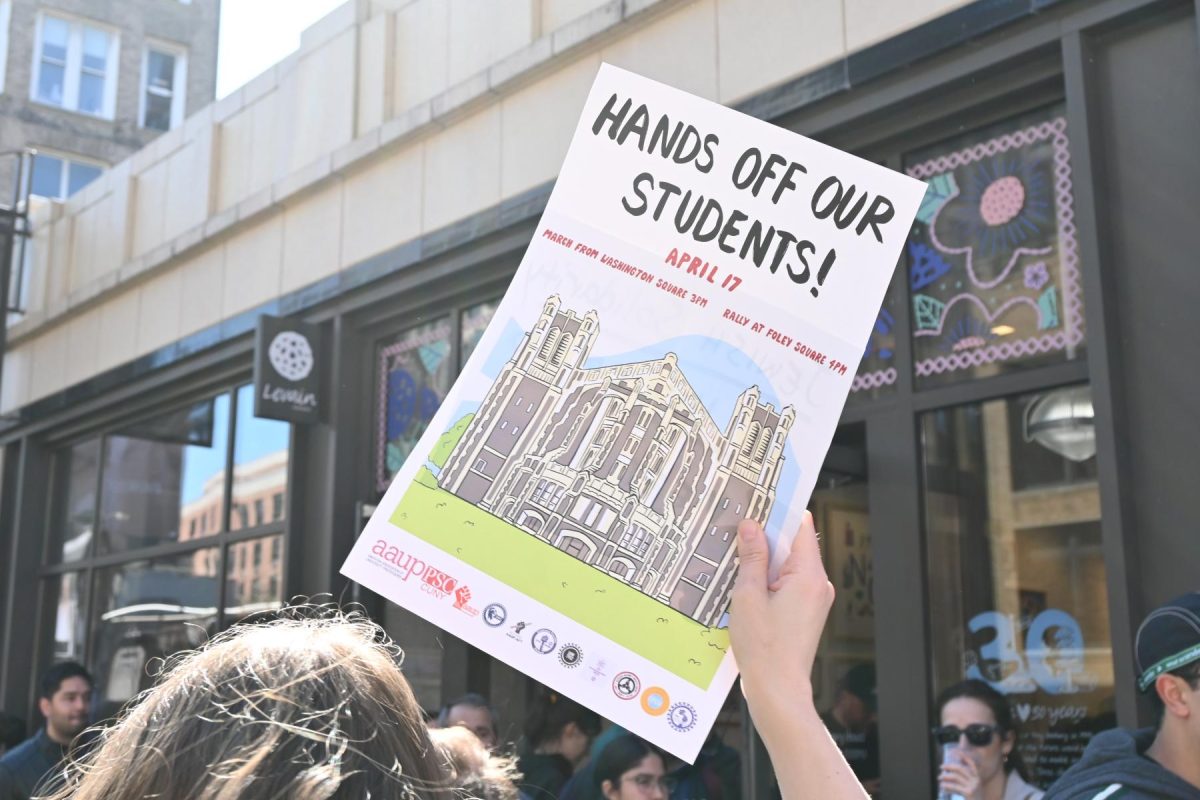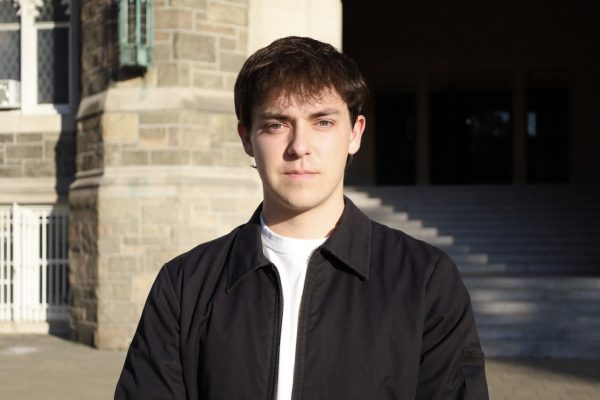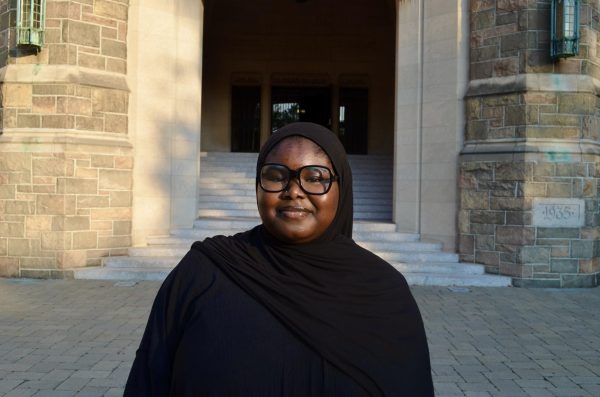Members of the Fordham University chapter of the American Association of University Professors (AAUP) joined a protest against the Trump administration’s attacks on higher education in America.
They joined with chapters from other universities and education groups last Thursday. It was a national day of action for higher education with protests across the U.S. condemning the Trump administration’s ongoing attacks on higher education, students and educators.
They marched from Washington Square Park and rallied in Foley Square in Lower Manhattan for the “Rally for the Right to Learn.”
“Every single one of us has something to fight for right now and our colleges and universities have been singled out for destruction and control by the Trump Administration,” said Zachary Samalin, a professor at New York University (NYU) and the first speaker during the rally at Foley Square. “We are coming together as students, workers, educators and New Yorkers to assert our fundamental rights to learn, to teach, to research, to associate and to protest.”
Speakers addressed the crowd at Foley Square and led protesters in collective chants. There were 11 speakers, including Rotua Lumbantobing, the vice president of the National AAUP and Baher Azmy, the legal director of the Center for Constitutional Rights and attorney for Mahmoud Khalil. A legal permanent resident, Khalil, was deported to El Salvador as the Trump administration cracked down on campus opposition to the war in Gaza.
“Make no mistake about this moment, what the government is doing has absolutely nothing to do with security; it is entirely about repression,” said Azmy. “The U.S. government is using every tool in its massive arsenal to arrest, to detain, to deport and, in the case of universities, to defund these institutions simply because they disagree with U.S. foreign policy.”
The other speakers shared the same sentiment: students, faculty and educators must rally together to demand that the federal government stop its attacks on higher education and students.
“It’s our time. We didn’t ask for it. We didn’t deserve it, but we need to meet the moment. Our message has to be very clear and expressed in one voice,” said James Davies, the Professional Staff Congress (PSC) president for the City University of New York schools. PSC represents over 30,000 faculty and professional staff across the city.
Dr. Thomas Beaudoin, who teaches at Fordham’s Graduate School of Religion and Religious Education, is the president of Fordham’s AAUP chapter. He and other Fordham faculty members gathered for the protest.
“I see protests as collective spiritual exercises,” said Beaudoin. “We come to transform ourselves into deeper love and commitment and courage about the struggle that needs to happen.”
The National AAUP was established in 1915 at a pivotal moment in U.S. history and higher education. After World War I, universities saw decreased class sizes, the rise of bureaucratic administrators and increased attacks on academic freedom. Professors and faculty created the AAUP to protect their interests and focus on what they felt higher education should be in the United States.
Now, higher education finds itself at another pivotal moment. Educational institutions have to navigate federal funding freezes, international student and faculty visas being revoked and the general “climate of fear,” as referenced in AAUP v. Rubio, that the federal government’s actions have created.
Fordham recently signed on to the amicus brief AAUP v. Rubio, joining 86 other universities and institutions. The Presidents’ Alliance on Higher Education and Immigration, a group of 570 presidents and chancellors of colleges and universities, submitted this brief to advise the District Court of Massachusetts about the effect of the White House targeting non-citizen students and faculty based on their dissident political views.
“The Alliance is dedicated to increasing public understanding of the impact of immigration policies on higher education, supporting policies that encourage international students and scholars to enrich American institutions of higher learning, and ensuring a talent pool that contributes to our communities and nation,” the brief said.
At this moment, the AAUP looks to increase its national presence and create a coalition of educational institutions, students, university workers and faculty to stand up against the federal government.
The AAUP is built on three main principles: academic freedom, shared governance and academic labor. These tenets can be found in Fordham’s university statutes, which directly shape the way the university is run and organized.
The list of universities having their federal funding targeted by the Trump administration is growing. These higher education institutions, such as Harvard University and Columbia University, have been presented with certain demands from the White House that they must agree witn maintain their federal funding.
“Trump’s attacks on education and educators are not stopping with Columbia,” said Michael Thaddeus, the vice president of Columbia University’s AAUP chapter. “We are all in the firing line together. It’s time for us, faculty and students, to stand up, organize and take action for ourselves.”
Harvard University was the first to take a stand against the Trump administration, refusing to comply with these demands. During the rally at Foley Square, speakers praised Harvard’s actions and called on other universities to follow suit.
As a Harvard alum, Beaudoin shared similar praise for the Ivy: “I’m very proud of Harvard for taking the stand that they have taken … it really needed to come from an elite university first to kind of open the door for everybody else to follow and to be a kind of cultural permission giving for all sorts of other universities to come on board.”
While Harvard continues to not comply with Trump’s demands, they have also escalated to suing the Trump administration on Monday over threats to their federal funding.
Fordham continues to evaluate its relationship with the Trump administration. The university is currently looking to hire a director of federal relations who will work from Washington, D.C.
Fordham’s faculty members themselves are also organizing. The Faculty Senate recently passed a unanimous resolution calling on the university to endorse and prioritize academic freedom, which is one of the key AAUP principles. Beaudoin expands on how the AAUP acts as an advocacy group.
“I think that this rally and … everything that is going into the pushback right now against fascism from the highest levels of the United States is the result of generations of organizing from AAUP advocates and faculty,” said Beaudoin.
He also spoke about what he has seen from Fordham faculty.
“On the one hand, there’s a tremendous amount of anxiety, and concern and uncertainty, fear, and in some cases, that leads to self-censorship and withdrawal from the engagement,” said Beaudoin. “I also see even in the same persons and even in myself, attempts at courage, attempts at trying to tell the truth.”
Beaudoin recommends that students and teachers get involved at this time.
“Get educated, get activated,” he said. “And come together with your colleagues to stand up for what’s right.”









































































































































































































